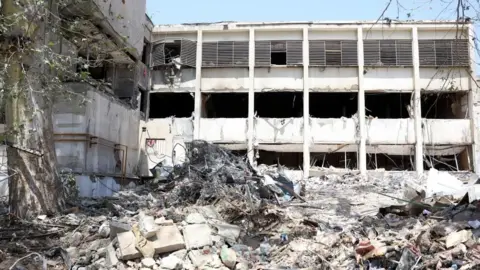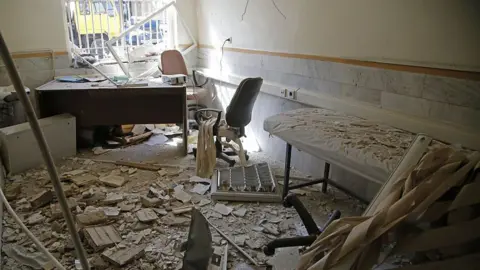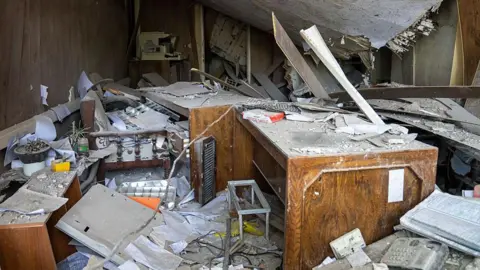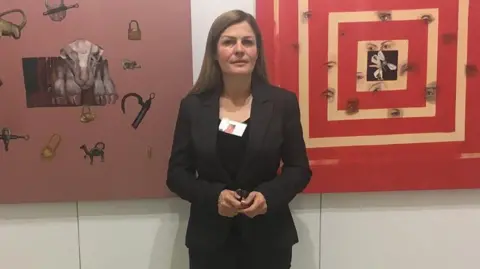BBC Persian, World Service reporter
 EPA
EPAOne month on from deadly Israeli air strikes on a notorious Iranian prison during the war between the two countries, inmates say they are being kept under unbearable and inhumane conditions after being moved to other prisons.
Despite promises by the authorities, some of those transferred from Evin Prison in Tehran say they continue to face difficulties such as overcrowded cells, lack of beds and air conditioning, limited number of toilets and showers, and insect infestations.
The BBC has received accounts from the family members of prisoners moved from Evin, who agreed to speak on condition of anonymity out of concern for the safety of themselves and the prisoners.
Israel targeted Evin on 23 June. According to the Iranian authorities, the attack killed 80 people, including five prisoners, 41 prison staff and 13 military conscripts.
The prison held thousands of men and women, including prominent political dissidents, human rights defenders, journalists and dual and foreign nationals, as well as members of religious and ethnic minorities.
All inmates were subsequently moved out and sent to other prisons following the attack.
Verified videos and satellite imagery confirm damage to several buildings within the complex, including the medical clinic, the visitor centre, the prosecutor’s office and an administrative building.
After the attack, the Israeli military described the prison as “a symbol of oppression for the Iranian people”. It said it carried out the strikes in a “precise manner to mitigate harm to civilians” imprisoned there.
Iran has labelled the attack a “war crime”.
 Fatemeh Bahrami/Anadolu via Getty Images
Fatemeh Bahrami/Anadolu via Getty ImagesIsrael’s military also said that Evin was used for “intelligence operations against Israel, including counter-espionage”. It did not comment further when asked to provide evidence for the claim.
Amnesty International said on Tuesday that, following an in-depth investigation, the attack constituted “a serious violation of international humanitarian law and must be criminally investigated as war crimes”.
“Under international humanitarian law, a prison or place of detention is presumed a civilian object and there is no credible evidence in this case that Evin prison constituted a lawful military objective,” it added.
Through his family members, one political prisoner who was sent to the Greater Tehran Central Penitentiary, also known as Fashafouyeh Prison, said that fellow inmates told him conditions there were inhumane even before Evin detainees were transferred.
He said that the prison was in such a remote and dangerous area outside the capital that his wife had not been able to visit him since he moved there.
Compared to Evin, which is in an accessible, residential area in north Tehran, Fashafouyeh is located 20 miles (32km) south of Tehran, in a desert with nothing around it but a road, according to the family members.
The prisoner told his family that many inmates were still sleeping on the floor at Fashafouyeh in overcrowded cells without air conditioning, although the authorities have said repeatedly that they will improve the situation.
A video from inside the prison, which has been verified by the BBC, shows a cell crowded with prisoners lying on beds and on the floor.
At one point, a group affiliated with the authorities came to the prison to film a video intended to show that prisoners were doing well, but other inmates began chanting “death to the dictator” – a popular protest slogan among Iranian opposition groups directed at the Supreme Leader, Ayatollah Ali Khamenei – and stopped them from filming, the family of the prisoner said.
Families of inmates in Fashafouyeh said that political prisoners were now staying in the same cell as those accused or convicted of violent crimes. This is a tactic that rights groups say Iran uses to intimidate political prisoners and is against the United Nations’ rules on the treatment of inmates.
Another political detainee transferred to Fashafouyeh described his cell to his family as being unbearable due to lack of hygiene, with bedbugs and cockroaches all around, adding that the prison lacks basic amenities even compared to Evin.
Human Rights Watch has previously accused the Iranian authorities of using threats of torture and indefinite imprisonment, along with lengthy interrogations and the denial of medical care for detainees. Iran has rejected these reports.
Although Evin has long drawn condemnation from human rights groups over alleged torture and threats, conditions at Fashafouyeh had been “underreported”, prisoners told the BBC.
Prominent Iranian journalist Mehdi Mahmoodian, who was also transferred from Evin to Fashafouyeh, said in a letter published on his Instagram page that due to the non-political nature of prisoners who were held there, they had been “long forgotten” and subjected to “years of humiliation, neglect, and oppression” because “they have no voice”.
 Majid Saeedi/Getty Images
Majid Saeedi/Getty ImagesFariba Kamalabadi, a 62-year-old Baha’i detainee who was transferred from Evin to Qarchak Prison, south of the capital, has said that she “would rather have died in the attack than be transferred to such a prison”.
Iran’s minority Baha’i community has long faced systematic discrimination and persecution, denied constitutional recognition and basic rights like education, public employment and religious freedom, because the Islamic Republic does not recognise it as a religion.
“Fariba has to live in Qarchak in an overcrowded cell, where it is so cramped that people have to take turns to eat food around the table, and then return to their beds afterwards because of the lack of space”, said her daughter, Alhan Taefi, who lives in the UK.
“Some of the roughly 60 prisoners who have been transferred from Evin with her are elderly women, and they do not receive proper medical care. There are flies everywhere in the cell. Her son-in-law and grandchildren, who are six and nine, were allowed to visit her in Evin but have not been granted permission to visit her yet, as they are not considered immediate family.”
The BBC has contacted the Iranian embassy in London for comment on the conditions of prisoners who have been transferred from Evin.
Civilian deaths
In the month since the strikes, the BBC has verified the deaths of seven civilians related to the attack on Evin, including a five-year-old boy, a doctor, and a painter.
Family members of Mehrangiz Imenpour, 61, a painter and mother of two who lived near the prison complex, told the BBC that she was “caught in the tragedy” of the attack.
 Family Handout
Family HandoutShe left home to use a cash machine and happened to be walking on a street adjacent to the prison’s visitor centre as Israel struck the complex, a family member said. She was killed by the impact of the explosion.
Her children are devastated, a relative recounted to the BBC.
“When two states engage in a conflict, people are the ones who pay the price. Both states are guilty, both are responsible, and both must be held to account”, the relative said.
Additional reporting by Shayan Sardarizadeh, BBC Verify






